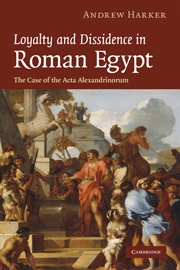Book contents
- Frontmatter
- Contents
- Note on abbreviations
- Chapter 1 Introduction
- Chapter 2 The embassies to Gaius and Claudius
- Chapter 3 The Acta Alexandrinorum: Augustus to the Severans
- Chapter 4 The Acta Alexandrinorum: The historical background
- Chapter 5 Between loyalty and dissent: The Acta Alexandrinorum and contemporary literature
- Chapter 6 Conclusion
- Appendix I Editions of the Acta Alexandrinorum and related texts
- Appendix II The status of the Alexandrian Jews
- Appendix III The ‘dubious or unidentified’ fragments
- Bibliography
- Index
Chapter 6 - Conclusion
Published online by Cambridge University Press: 22 September 2009
- Frontmatter
- Contents
- Note on abbreviations
- Chapter 1 Introduction
- Chapter 2 The embassies to Gaius and Claudius
- Chapter 3 The Acta Alexandrinorum: Augustus to the Severans
- Chapter 4 The Acta Alexandrinorum: The historical background
- Chapter 5 Between loyalty and dissent: The Acta Alexandrinorum and contemporary literature
- Chapter 6 Conclusion
- Appendix I Editions of the Acta Alexandrinorum and related texts
- Appendix II The status of the Alexandrian Jews
- Appendix III The ‘dubious or unidentified’ fragments
- Bibliography
- Index
Summary
Musurillo pioneered the view that the Acta Alexandrinorum were political in character, the literary expression of a discontented Alexandrian elite, who wrote pamphlets to stir up opposition and anti-Roman feeling in Alexandria, ‘campaigning’, as it were, for the restoration of the Alexandrian boule. Although basing their stories on the official minutes of historical trials in the imperial court, the writers of the Acta Alexandrinorum twisted these records for their propagandist purposes, producing a unique literary phenomenon.
Through examining the individual stories and placing the literature into its wider literary context, I have argued for a different interpretation of the Acta Alexandrinorum. I began my study by clearly differentiating between the Acta Alexandrinorum proper and the literature related to them. I have argued that the Acta Alexandrinorum proper and the Acta related literature belong to a spectrum of writings about the politics of Alexandria under Roman rule. These writings ranged from ‘copied’ documents and historical writings to almost novelistic literary compositions. While many pieces of the Acta related literature belong nearer the former end of this spectrum, the Acta Alexandrinorum proper belong at the latter end. However, as I noted during my review of the texts, many pieces of the Acta related literature share common literary themes with the Acta Alexandrinorum proper. Indeed, the characterisation of the brave Alexandrian ambassadors who prosecute Roman prefects on behalf of their fatherland is often similar to that of those Alexandrians who face Jewish embassies in the imperial court.
- Type
- Chapter
- Information
- Loyalty and Dissidence in Roman EgyptThe Case of the Acta Alexandrinorum, pp. 174 - 178Publisher: Cambridge University PressPrint publication year: 2008

